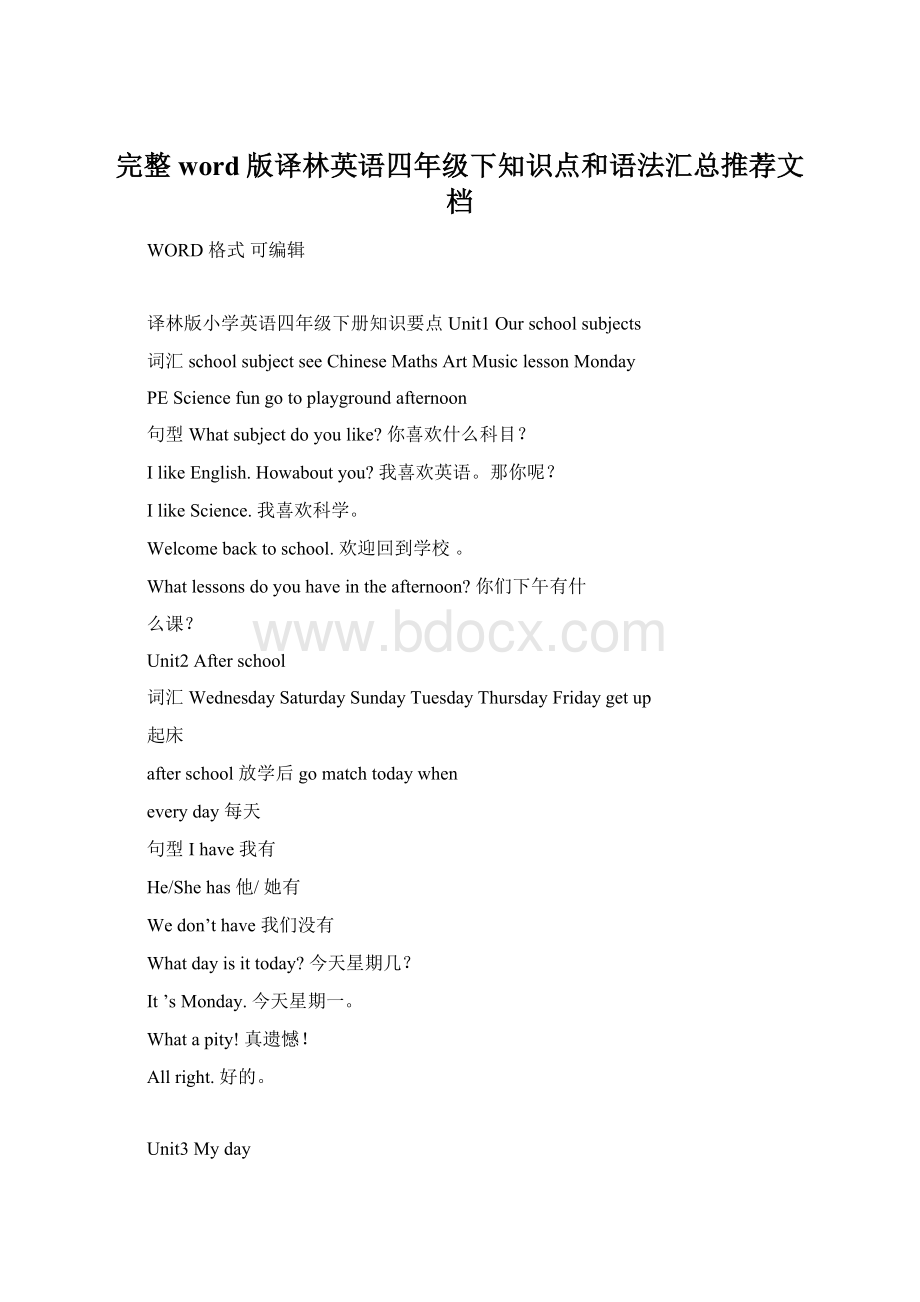完整word版译林英语四年级下知识点和语法汇总推荐文档.docx
《完整word版译林英语四年级下知识点和语法汇总推荐文档.docx》由会员分享,可在线阅读,更多相关《完整word版译林英语四年级下知识点和语法汇总推荐文档.docx(18页珍藏版)》请在冰豆网上搜索。

完整word版译林英语四年级下知识点和语法汇总推荐文档
WORD格式可编辑
译林版小学英语四年级下册知识要点Unit1Ourschoolsubjects
词汇schoolsubjectseeChineseMathsArtMusiclessonMonday
PESciencefungotoplaygroundafternoon
句型Whatsubjectdoyoulike?
你喜欢什么科目?
IlikeEnglish.Howaboutyou?
我喜欢英语。
那你呢?
IlikeScience.我喜欢科学。
Welcomebacktoschool.欢迎回到学校。
Whatlessonsdoyouhaveintheafternoon?
你们下午有什
么课?
Unit2Afterschool
词汇WednesdaySaturdaySundayTuesdayThursdayFridaygetup
起床
afterschool放学后gomatchtodaywhen
everyday每天
句型Ihave我有
He/Shehas他/她有
Wedon’thave我们没有
Whatdayisittoday?
今天星期几?
It’sMonday.今天星期一。
Whatapity!
真遗憾!
Allright.好的。
Unit3Myday
词汇usually经常gotoschool去上学inthemorning在上午inthe
afternoon在下午
gohome回家homeworkwatchTV看电视
intheevening在晚上
havelunch吃中饭havedinner吃晚饭gotobed睡觉
atnight在夜里
句型whendoyougotobed?
你什么时间睡觉?
Igotobedatnine.我9点睡觉
Unit4Drawinginthepark
词汇parkdrawflowerthemboatriverlake
drawingeasydifficulttryhillagain
句型whatcanyousee?
你能看到什么?
Ican我能
Goodidea!
好主意!
Unit5Seasons
专业技术知识共享
WORD格式可编辑
词汇seasonsspringwarmsummerhotautumncoolwintercold
flykite放风筝goboating去划船goswimming去游泳picnicgo
climbing去爬山goskating去滑冰finewhose
句型inspring,itiswarm在春天里,它是暖和的。
Wegoboating.我们去划船。
Unit6Whosedressisthis?
词汇dresspartycoatshirtsweaterhand
tootrousersglovesojeansshortswrongmovehurt
句型Whosedressisthis/that?
这/那是谁的裙子?
Whoseglovesarethses/those?
这些/那些是谁的手套?
It’s/Thryaremyfather’s.它是/它们是我父亲的。
Ithinkso.我想是这样。
What’sthematter?
怎么了?
?
Unit7What’sthematter?
词汇thirstywaterilltiredhappy
dearMrsspeak
句型What’sthematter?
怎么了?
I’mcold.我感冒了
CanIhavesomewater?
我能喝些水吗?
Hereyouare.给你。
Comeandhave?
来吃?
Iwantto我想
Goodnight.晚上好。
Unit8Howareyou?
词汇mayheretakecare保重;小心atschool在学校
cometoschool来学校coldfevercoughheadache
句型thisisYangLingspeak.我是杨玲。
MayIspeaktoMissLi?
我可以和李小姐说话吗?
I’msorrytohearthat.我很抱歉听到那个。
Howareyou?
你好吗?
I’mfine,thankyou./Notsogood.我很好,谢谢。
/不太好。
Seeyoutomorrow.明天见。
Seeyou.再见。
Review&CheckUnit1-Unit4Unit1-Unit4课文重点内容详解:
1.—Whatsubjectsdoyoulike?
—IlikeEnglishandMaths.
—Metoo.
1)“Whatsubjectsdoyoulike?
”意思是:
你喜欢什么科目?
这个时候,subject后面一般会加上“-s”。
如果询问“你喜欢哪门课?
”,这时候我们可
专业技术知识共享
WORD格式可编辑
以用”Whichsubjectdoyoulike?
”来表示。
2)“Metoo”是”我也是“意思。
2.—Oh!
It’stimeforPE.
—Let’sgototheplayground.
1)表示“该是的时候了。
/的时候到了。
”我们可以用以下两种句型来表达:
It’stimeforsth.=It’stimetodosth.
eg.:
It’stimeforbreakfast.=It’stimetohavebreakfast.
2)Let’s=Letus让我们
拓展:
在操场上:
intheplayground[英],ontheplayground[美]
3.Whatlessonsdowehavethismorning?
1)lesson的意思是“课、课程”。
2)“今天早上、下午和晚上”用“thismorning/afternoon/evening”来表
示,且此时在“this”前不需要加上介词。
3)“have”的三单形式是:
has。
4.IlikePE.It’sfun.
1)PE是“physicseducation”的首字母缩写。
2)“It’sfun.”相当于“It’sinteresting.”,是“很有趣。
”的意思。
“fun”是不可数名词,表示“乐趣,有趣的事”。
拓展:
havefun=haveagoodtime玩得很开心
5.—Whatdayisittoday?
—It’sWednesday.
问“星期几”的英语表达方式:
Whatdayisittoday?
=What’sthedaytoday?
英语国家把“星期日”作为一个星期的第一天(“thefirstdayofaweek)。
一个星期七天的英语表达方式:
Monday星期一,Tuesday星期二,Wednesday星
期三,Thursday星期四,Friday星期五,Saturday星期六,Sunday星期天。
拓展:
表示在具体的“星期几”的时候,要用介词on。
介词on通常用在表示具
体的某一天之前。
如:
在周六onSaturday;在周六早晨onSaturdaymorning。
而如果没有说具体某一天的早晨,我们仍然用介词in:
inthemorning/
afternoon/evening在早上/下午/晚上。
6.Ihaveaswimminglesson.我有一节游泳课。
“swim”是以重读闭音节结尾的单词,后面加上“ing”时,要先双写最后一个辅音“m”。
类似的动词有:
run-running(跑、跑步),shop-shopping(购物、逛
街),sit-sitting(坐),jog-jogging(慢跑),chat-chatting(闲聊、聊天),etc.。
7.Whatapity!
(感叹句)真遗憾啊!
类似的结构有:
Whatabigegg!
多么大的一个鸡蛋啊!
Whatabeautifulflower!
多么漂亮的一朵花啊!
8.—WhataboutSaturday?
Wedon’thaveanylessononSaturday.
—Allright.
专业技术知识共享
WORD格式可编辑
1)“Whatabout...?
”=Howabout...?
怎么样?
此句型用来表示”提议和询问“,后接名词、代词和动名词形式。
eg.:
Whataboutgoingtothepark?
去公园怎么样?
Howaboutgoingswimming?
去游泳怎么样?
2)“don’t”是一般现在时中,当主语非第三人称单数时,疑问句和否定句中,要用do和don’t作助动词,后接动词原形。
拓展:
当主语是第三人称单数(he,she,it)时,要用助动词does和doesn’t。
3)allright=Ok
拓展:
That’sallright.没关系。
/不用谢。
4)在一般情况下,some用于肯定句,而any用于否定句和疑问句。
但当出现下列句型时,我们仍使用some,而不用any:
—Wouldyoulikesomebananas?
您要一些香蕉吗?
—Doyouwantsometea?
您要一些茶吗?
—CanIhavesomethingtodrink?
我能要一些喝的吗?
9.Igetupatseven.Iusuallygotoschoolatsevenforty.Ihavefourlessonsinthemorning.Ihavelunchattwelve.
1)getup起床
与get相关的词组拓展:
geton上车getoff下车
usually通常,是表示频度的副词,常用于一般现在时中。
在英语中,表示频率的副词还有:
always总是,oftern经常,sometimes有时,seldom很少、极少,hardly几乎不,never从不,etc.。
2)gotoschool去上学
拓展:
come/gohome回家,gotobed去睡觉,gotohospital去医院,gotochurch去做礼拜
3)inthemorning在早上
表示具体某一天的早晨、中午、晚上,要用介词on,如:
onSaturdaymorning,onacoldevening
4)havelunch吃午饭
拓展:
havebreakfast吃早饭,havesupper=havedinner吃晚饭
注意:
在早、中、晚饭前不加定冠词“the”。
atseven/senvenforty/twelve都是表示具体的时间点,要用介词at。
5)具体时间的表达方式:
在8点:
ateight(o’clock)
在8点半:
athalfpasteight=ateightthirty
在8点10分:
attenpasteight=ateightten
在8点50分:
attentonine=ateightfifty
在8点一刻:
ataquarterpasteight=ateightfifteen
在8点三刻:
ataquartertonine=ateightforty-five
练习:
1:
58的英语表达__________________________________________
10.Ihavetwolessonsintheafternoon.Iplayfootballatfourandgohomeatfourforty.Idomyhomeworkatfivethirty.
专业技术知识共享
WORD格式可编辑
1)“play”的用法:
play+运动名称,注意在运动名称前不能加定冠词“the”,如:
playvolleyball打排球
play+棋牌类游戏名称,如:
play(Chinese)chess下(象)棋;playcards打
牌
play+the+乐器类名称,注意在乐器类名称前要加定冠词“the”,如:
play
thepiano弹钢琴;playtheviolin拉小提琴;playtheguitar弹吉他
play+with+sb.(某人)/sth.(某物),如:
playwithme和我玩;playwith
ballons(气球)/lanterns(灯笼)
playgames玩游戏
2)doone’shomework做(某人的)家(庭)作(业)
“work”作为名词,表示“工作”时,是不可数名词;“work”还可作为动词,表示“工作”。
拓展:
dohousework做家务
11.IusuallyhavedinneratsixfifteenandwatchTVatseven.Igotobedatnineeveryday.
1)06:
15的英语表达方式:
sixfifteen=aquarterpastsix
2)gotobed去睡觉
3)everyday每天
拓展:
everysecond/minute/hour/week/month/year每秒/分钟/小时/周
/月/年
12.—I’mhungry,Sam.—山姆,我饿了。
—Whendoyouhavedinnereveryday?
—你每天几点吃晚饭?
—Atsix.—六点。
1)hungryadj.饿了的;饥饿的【反义词】full
同类词:
thirsty渴的;口渴的
2)“When”,特殊疑问词,表示“什么时候”,相当于“Whattime”,只不过
“Whattime”表示的时间比“When”更具体,更精确。
在英语中,小学阶段学到的特殊疑问词除了“When”之外,还有:
What什么What+n.(eg.Whatcolour/class什么颜色/班级,etc.)
Which哪一个,哪个Who谁Whom谁(宾格)Whose
谁的
When什么时候Where在哪里Why为什么
How怎样(表方式)
Howabout...?
=Whatabout+(doing)sth.?
(做)事怎么样?
Howmany+可数名词复数+(arethere)?
(有)多少?
eg.:
Howmanyteachersarethereinyourschool?
你们学校有多少老师?
Howmanyballgamescanyouplay?
你能打多少种球?
Howmuch表示“多少钱”?
实际上是“Howmuchmoney”的缩略问句,
“money”意为“钱”,是不可数名词,在口语中一般省略“money”,直接用
“Howmuch”表示“多少钱”。
Howmuch+不可数名词+(isthere)?
(有)多少?
专业技术知识共享
WORD格式可编辑
eg.:
Howmuchwateristhereinthebottle?
瓶子里有多少
水?
Howmuchtimedowehavetodoourhomework?
我们有多
少时间做家庭作业?
3)every+day/week/month/year,etc.是一般现在时的时间标志词,在肯
定的缩略问句、疑问句中和否定句中:
若主语非第三人称单数,我们要使用助动词do和don’t(=donot)。
eg.A.—Doyougohomeonfooteveryday?
你每天都是走路回家吗?
—Yes,Ido./No,Idon’t.
拓展:
B.—Howoftendotheygoswimming?
他们多久游一次泳?
—Twiceamonth.一个月两次。
若主语是第三人称单数,我们要使用助动词does和doesn’t(=doesnot)。
eg.A.—Doeshegotoschooleveryday?
他每天都去学校上学吗?
—Yes,hedoes./No,hedoesn’t.
B.—Howmanysubjectsdoesyoursisterhaveeveryterm?
你姐姐每学
期有多少门课?
—Ten.十门课。
13.—Whattimeisitnow?
现在几点了?
—It’sseveno’clock.七点了。
1)Whattimeisitnow?
=What’sthetimenow?
类似的表达时间的句型有:
Whatdayisittoday?
=What’sthedaytoday?
今天星期几?
Whatdateisittoday?
=What’sthedatetoday?
今天几号?
2)It’sseveno’clock.里的It’s和o’clock都可以省略。
“o’clock”表示点(整).
14.—Whatcanyouseeoverthere,Bobby?
—Icanseeacake.
1)overthere的意思是“在那儿”;
2)要注意含有情态动词“can,may,must”等的各类句型。
15.Whatabigcake!
本句是感叹句。
感叹句一般由What和How引导。
1)由What引导的感叹句句式:
A.What+a/an+adj.(形容词)+n.(名词)(+itis)!
eg.:
Whatabeautifulflower(itis)!
Whatanimportantsubject(itis)!
B.What+adj.+可数名词复数(+theyare)!
eg.:
Whatbeautifulflowers(theyare)!
C.What+adj.+不可数名词(+itis)!
Eg.Whatgoodweather(天气)(itis)!
专业技术知识共享
WORD格式可编辑
2)由How引导的感叹句句式”
A.How+adj.+(the+主语)+be动词!
eg.:
Howbeautifulthefloweris!
Howbadtheweatheris!
B.How+adv.+(the)+主语+行为动词!
eg.:
Howfastheruns.
Howfasthecanrun.
Howfastheisrunning.
Howfastheran.
16.—Let’sdrawsomepictureshere.
—Goodidea.
1)drawpictures画画
2)Goodidea.好主意。
17.—Whatcanyouseeoverthere?
—Icanseeatreeandsomeflowers.
—Canyoudrawthem?
—Sure.It’seasy.
1)
“overthere”在那边
2)
“Sure.”(当然了。
)相当于“Certainly./Ofcourse.”。
3)easy的反义词为different/hard。
18.—Thisisatreeandtheseareflowers.
—Welldone.
1)指示代词:
this这,这个;these这些
that那,那个;those那些
2)Welldone.做得好。
/干得好。
19.—Canyouseetheboatontheriver?
—Yes.
—Canyoudrawit?
—It’sdifficult,butIcantry.
—Isthisaboat?
1)
“see”是“看见”的意思,强调看的“结果”。
而“look(at)
”强调看的
“动作”。
2)
表示“船、树叶、鸭子等漂在河面上”,可用“
ontheriver
”表示。
表示“鱼、石头”等在河里,用“intheriver
”表示。
3)river河;lake湖;sea海;ocean洋
3)“try”,“尝试;努力”的意思
拓展:
haveatry试一试
trytodosth.努力做某事tryone’sbesttodosth.尽
某人全力做某事
trydoingsth.尝试做某事
Unit5知识点
专业技术知识共享
WORD格式可编辑
重点词汇
单词:
spring春天summer夏天autumn秋天winter冬天
warm温暖的hot热的cool凉快的cold寒冷的
词组:
inspring/summer/autumn/winter在春